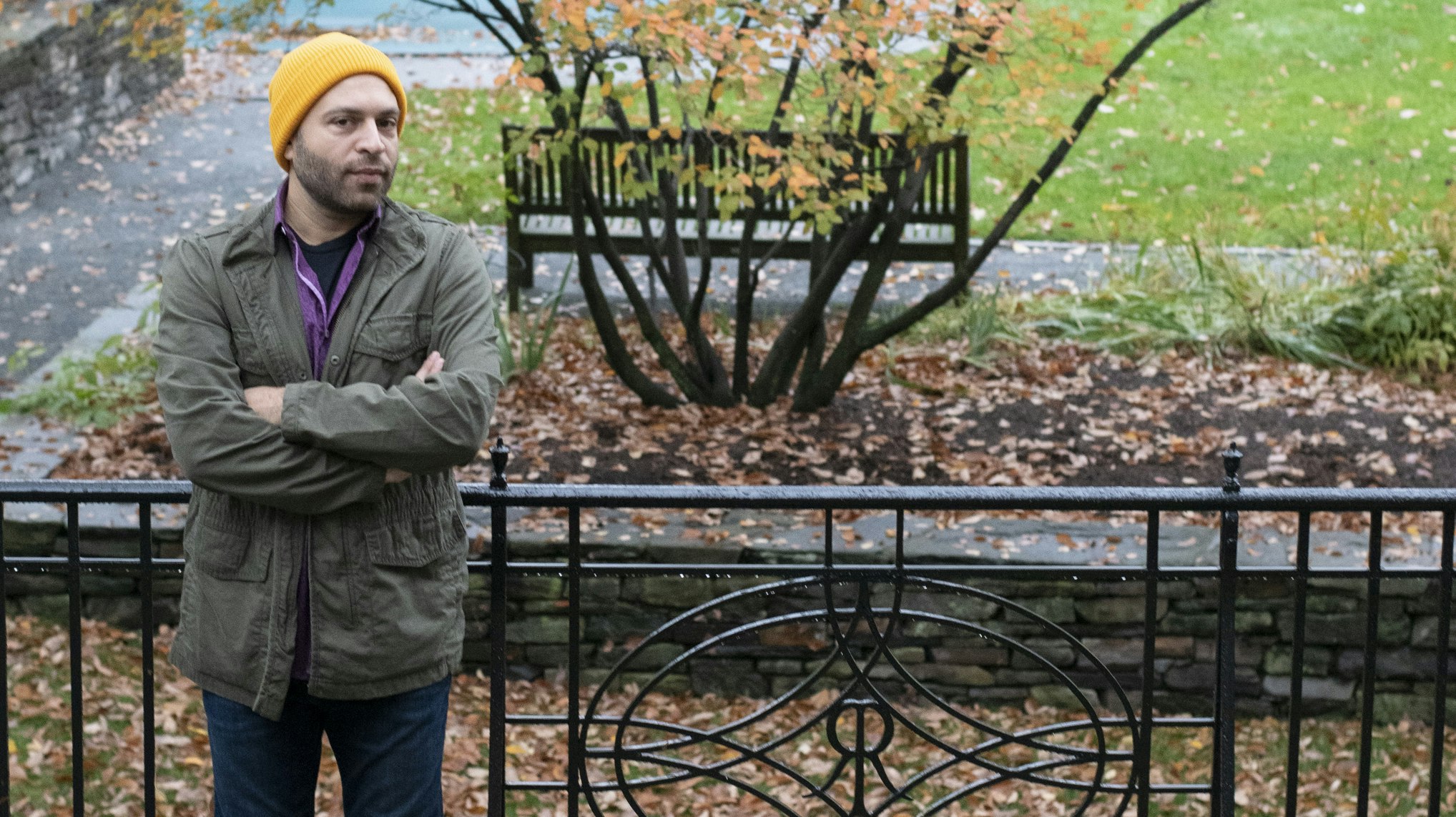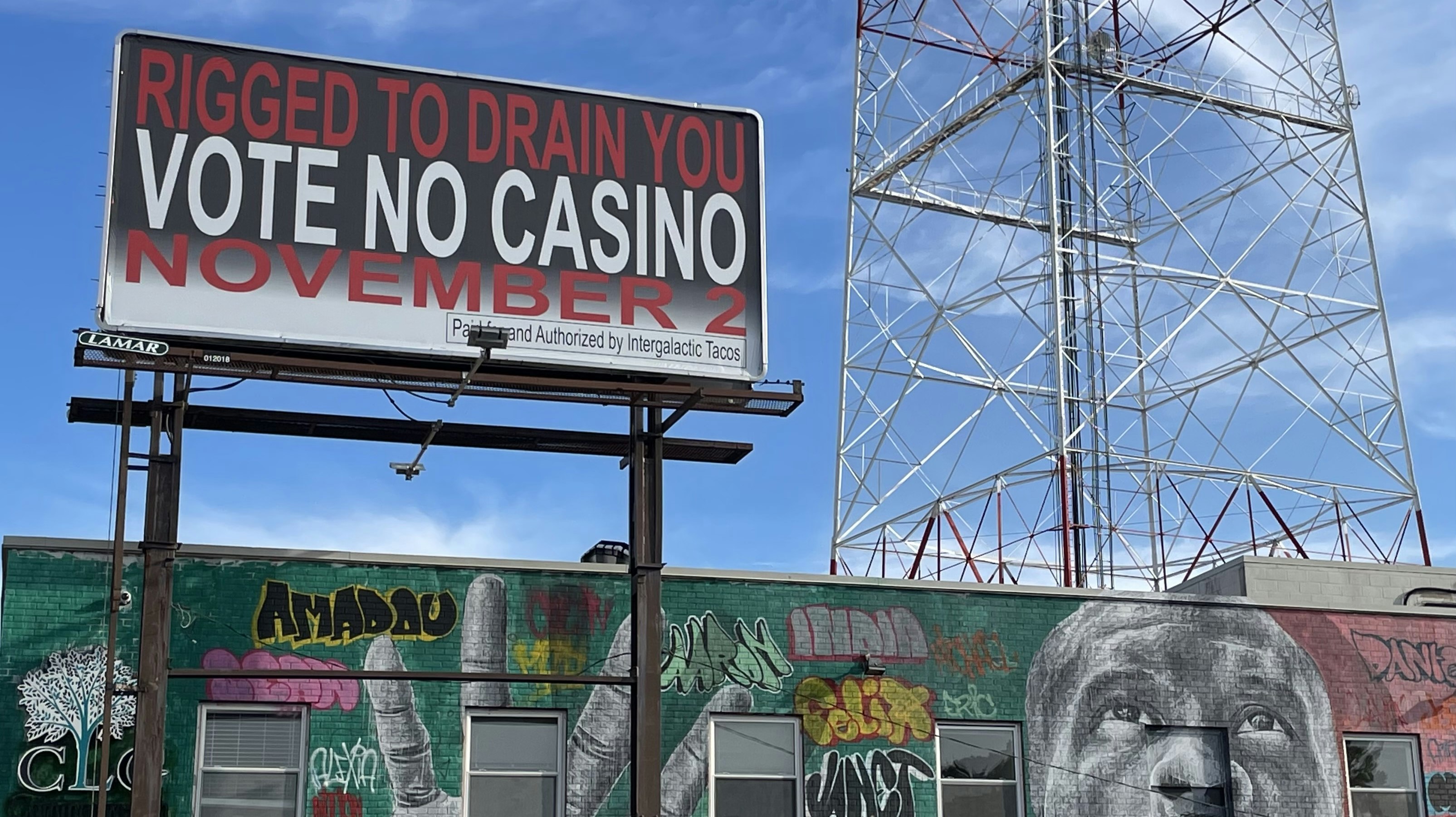A Consequential Detour

After immersing himself in politics in Richmond, Virginia, the composer David Dominique finds a way to infuse his work with new meaning.
In early November, voters in Richmond, Virginia, were asked to cast their ballots on a referendum for a proposed casino, ONE Casino + Resort. The project was billed as an investment in Black uplift, to be spearheaded by the Black CEO of Urban One and loudly supported by the city’s Black mayor and several Black city council members. Corporate and government proponents poured over $1 million into advertising, garnering support and promotional appearances from Missy Elliot, Jamie Foxx, and Al Sharpton. A flood of posters, mailers, billboards, and paid social media ads boasted that the casino would inject $50 million into the local economy each year and help revitalize the poorest part of the city: the majority-Black Southside. Everyone expected the measure to pass.
But a small, multiracial group of activists was not convinced by the brightly colored posters and celebrity endorsements. More compelling to them was the overwhelming evidence that casinos do not have a positive impact on local communities and that, time and time again, such establishments have preyed upon the elderly, the addicted, and those in desperate economic circumstances. Among this group of activists was the composer David Dominique, the 2021–2022 Frances B. Cashin Fellow at Harvard Radcliffe Institute.
Galvanized into exposing the proposal for masquerading as a pro-Black initiative, Dominique threw himself into the opposition campaign, going so far as to put up six billboards and a number of social media advertisements on his own dime. One infographic used the number of Richmond residents addicted to gambling and the annual cost to the community of the average gambler to estimate that ONE Casino + Resort would cost Richmond $320 million per year, far above the highly touted $50 million that would supposedly be added to the economy. After going viral on Dominique’s personal Instagram account, he paid to promote the post as an advertisement on that platform. Between 50,000 and 100,000 people in the Richmond area saw his content, both firsthand and through reposts, in the days leading up to the election. Dominique’s account alone had more than 200,000 impressions during this period.
While the casino is reported to have spent over $2 million, the opposition had a budget of under $100,000. In the 2020 election cycle, casino referendums in four other Virginian cities passed easily, and in the spring of 2021, approval of the casino led dissent by over 30 points. According to Dominique, inside polling in the weeks before the election also indicated a victory for the casino. “We weren’t supposed to win,” says Dominique. And yet, when the polls closed on November 2, the No campaign came away victorious, winning by fewer than 2,000 votes.
For Dominique, it is imperative that “those interested in racial justice pay close attention to the nuances within optical racial politics.” The racial representation that would have been achieved by Richmond housing the nation’s only Black-owned casino is not synonymous with equity and social justice for the city’s communities, and it is such complexities that the composer plans to explore in his upcoming project.

In an effort to block the proposed ONE Casino + Resort, Dominique put up six billboards in the Richmond area. Photo courtesy of David Dominique
Dominique got his start in music at an early age, banging utensils on the floor of his parents’ kitchen. Although he was deeply involved in music throughout his schooling, he had every intention of pursuing a “serious” profession, until learning about a musician family friend while he was in college made him realize that a career in music was actually a possibility. In fact, he says, “I really didn’t think it was plausible as a career until I got my tenure track job, honestly.” After securing his assistant professorship at William & Mary, Dominique opted to move to Richmond, despite the hour-long commute. He didn’t know a soul in the state of Virginia, and he was attracted to the “vibrant, arts-rich, diverse city,” rife with what he describes as “cultural treasures.”
In recent years, Dominique’s work has primarily consisted of compositions for jazz ensembles and a deep dive into electronic music. And then 2020 happened.
When massive protests broke out around the world following the murder of George Floyd, Dominique was struck by how the discourse around race and equality—with which he had been involved for a long time—was evolving and expanding. He took to the streets to join the protests in his community. “I tried to figure out what my place would be and how I could best use my skill set, my experience studying race and my experience as a Black person in the United States,” says Dominique. Quite organically, he turned to writing. Dominique documented the protests he attended and interviewed politicians and other stakeholders he encountered, pitching some stories to RVA Mag and Style Weekly but self-publishing most of his political journalism on social media.
During this period dedicated to journalism, Dominique wasn’t writing much music, and he began to feel less like a musician and more like a writer. “I started to feel unbalanced, and I was seeking ways to synthesize my previous work in music with the themes that I was covering and critiquing in my writing,” he says. “And that’s what gave me the idea that maybe there was a way to create a large-scale musical piece that would draw upon my experience in Richmond politics.”
The process has not been easy. “It doesn’t feel natural at all!” says Dominique. “And I would like that to be written with an exclamation point.” While he has made political music in the past, this project is an attempt at an embodied representation of his contemporary politics and racial concerns, and it’s more closely related to his own life than anything he’s done before. The difficulty comes in finding a way to relay those experiences authentically. “These political and social issues are so sensitive and so close to home that it takes a lot of reflection and grappling with the pitfalls to work through how I can do this in a manner that is completely ethical—one that’s honest to my experience, that tells you something about what has gone on here and the way in which I’ve experienced it, but that also can be understood and have similar meaning to people who have no relationship to Richmond or its politics,” he says.
Indeed, Dominique describes his endeavor as feeling “vaguely reputationally dangerous.”

Dominique is now drawing on his experiences in Richmond politics to create a large-scale, experimental musical piece. Photo by Tony Rinaldo
He is looking to create a collage of sorts, comprising original music, texts of Black radical theory and poetry, and footage from Richmond, among other elements. It is impossible, Dominique has decided, to put together any kind of linear narrative, so he instead plans to craft a series of panels or scenes. The danger, he finds, lies in the project being mistaken for something authoritative, being mistaken for The Story of Richmond in 2020. “For me, the challenge is to show that what I’m doing is consciously subjective,” he says. “There are thousands of people who own a piece of this story, and each of them has their own set of observations and understandings. Mine is just one subjective understanding of the recent history of Richmond.” The conceit and experimental form of this story have already evolved numerous times and will continue to evolve. In fact, by the time this article goes to print, this description may already be fairly obsolete.
For Dominique, the success of the casino referendum opposition campaign marks his proudest major win as an activist and serves as a reminder of the motivations behind his academic work. Whether it be in sheet music, journalism, or in the streets demanding change, he will continue to explore the nuances of the fight for equality.
Iman Lavery ’22 is a concentrator in English with a secondary in film and visual studies and an intern in Harvard Radcliffe Institute’s Office of Communications.







